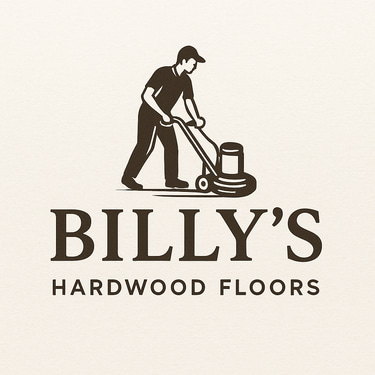Why Hardwood Flooring is a Sustainable Choice for Homeowners
Billy's Hardwood Floors
2/17/20253 min read
In today’s eco-conscious world, homeowners are becoming increasingly mindful of the environmental impact of the materials they choose for their homes. One area where this trend is gaining traction is in flooring options. While there are numerous choices available, hardwood flooring stands out as a durable, beautiful, and sustainable solution. But is it truly a green choice? Let’s explore why hardwood flooring is an environmentally responsible option that can help homeowners contribute to sustainability.
1. Renewable Resource: A Naturally Sustainable Material
Hardwood floors are made from trees, and as long as these trees are responsibly harvested, they represent a renewable resource. The key to sustainability with hardwood flooring is ensuring that the wood comes from well-managed forests. Sustainable forestry practices ensure that trees are harvested at a rate slower than or equal to the forest’s ability to regenerate. Many hardwood floor manufacturers now source their wood from forests certified by organizations like the Forest Stewardship Council (FSC), which guarantees that the wood is harvested responsibly.
Additionally, hardwood trees grow over long periods of time, making them a lasting and renewable resource, unlike synthetic or laminate flooring, which often comes from non-renewable resources like petroleum-based products.
2. Durability and Longevity: A Floor that Lasts for Generations
One of the biggest advantages of hardwood flooring is its longevity. Hardwood floors can last for decades, or even centuries, if properly maintained. This long lifespan minimizes the need for replacements, which can contribute to less waste and fewer resources being used over time. While other types of flooring—such as carpet or vinyl—may need to be replaced every 10 to 20 years, hardwood can often be refinished multiple times, renewing its appearance and extending its life even further.
By investing in durable hardwood floors, homeowners can reduce the frequency of replacements, thus decreasing the overall environmental impact of flooring throughout the lifetime of a home.
3. Minimal Waste: A Natural, Biodegradable Option
Unlike many synthetic flooring materials, hardwood floors are biodegradable at the end of their life cycle. If a hardwood floor is ever removed or replaced, the material can be repurposed or recycled. Hardwood can be upcycled into furniture, cabinetry, or other products, contributing to a circular economy. In contrast, non-biodegradable flooring options, such as vinyl, can remain in landfills for hundreds of years, contributing to long-term waste.
Additionally, the manufacturing process for hardwood flooring generates less waste compared to other materials. Many manufacturers make use of nearly every part of the tree, from the trunk to the smaller branches, ensuring that nothing goes to waste.
4. Energy Efficiency and Low Carbon Footprint
The carbon footprint of hardwood flooring is generally lower than that of many other flooring options. The energy required to harvest, process, and install hardwood floors is often lower than for more energy-intensive materials like carpet or synthetic flooring. The production of hardwood flooring also tends to produce less air and water pollution compared to non-renewable flooring materials.
Moreover, hardwood floors act as carbon sinks over their lifespan, absorbing and storing carbon dioxide that would otherwise contribute to climate change. The wood continues to store carbon even once it's installed in your home, making it a natural way to help offset your environmental impact.
5. Sustainable Hardwood Sourcing: Certifications Matter
If you’re concerned about the sustainability of your hardwood floors, look for certifications like the Forest Stewardship Council (FSC) logo, which ensures that the wood has been responsibly harvested from forests that are managed to support biodiversity, productivity, and ecosystem health. FSC-certified wood comes from well-regulated forests that prioritize the health of the environment and communities.
By choosing hardwood flooring from certified sustainable sources, you’re contributing to forest preservation and encouraging responsible harvesting practices that benefit the planet.
6. Aesthetic Appeal: Timeless and Natural Beauty
Beyond sustainability, hardwood floors offer timeless beauty and elegance that complements any interior design. This aesthetic appeal often leads to hardwood being seen as a long-term investment in a home’s value. Unlike trends in synthetic materials, hardwood’s natural grains and warm tones age beautifully and never go out of style. A well-maintained hardwood floor enhances the look of a home, making it a worthwhile investment that will last both stylistically and functionally for generations.
7. Hardwood Flooring vs. Alternatives: Why It’s the Best Choice
While there are other "eco-friendly" flooring options available, many are not as sustainable as they appear. For example:
Bamboo: While bamboo is a rapidly renewable resource, the manufacturing process often involves heavy chemical treatments that can be harmful to the environment. Additionally, the long shipping distances from Asia to the U.S. increase its carbon footprint.
Recycled Materials: Flooring made from recycled materials (like rubber or plastic) can be a good option for reducing waste, but it’s not always biodegradable and may still contribute to pollution during its production.
Cork: Cork is renewable, but the harvesting process can sometimes damage the cork oak trees, which are not always sustainably managed.
Hardwood, when sourced sustainably, remains a superior option for its balance of environmental impact, durability, and aesthetic appeal.
Conclusion: Sustainable, Beautiful, and Lasting
In conclusion, hardwood flooring is one of the most sustainable flooring choices homeowners can make. From being a renewable resource and biodegradable material to its long lifespan and minimal waste generation, hardwood floors are an eco-friendly option that doesn’t sacrifice beauty or durability. By choosing hardwood floors that are responsibly sourced and maintained, homeowners can enjoy a beautiful, sustainable living space while reducing their environmental footprint. For those looking to make an environmentally responsible investment, hardwood flooring is truly a green choice that will last for generations.
